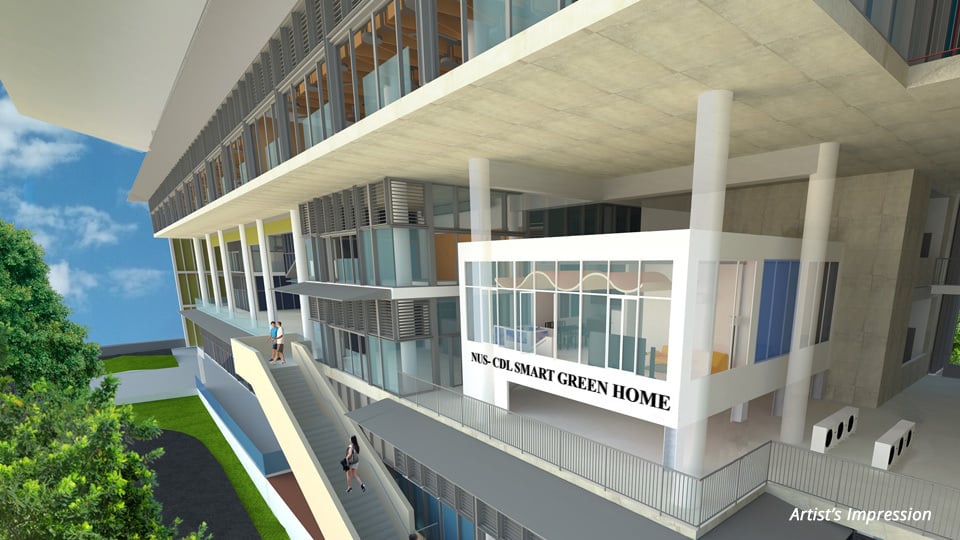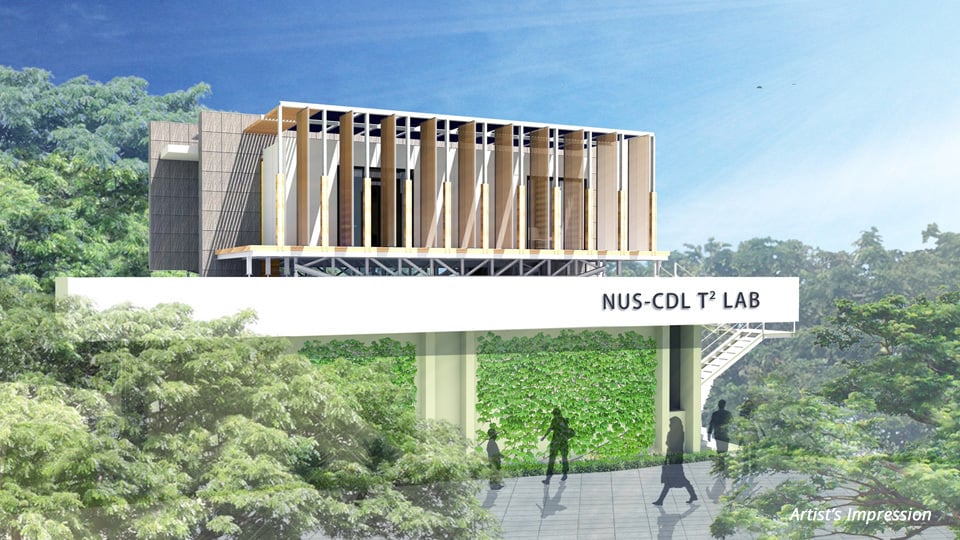Singapore, 22 March 2016 – The National University of Singapore (NUS) School of Design and Environment and City Developments Limited (CDL) today announced their partnership in promoting innovations in smart, green building technologies. CDL made a gift of S$2.25 million to the School to establish two new research laboratories dedicated to the study of smart building technologies for indoor and outdoor environments, and to provide funding for research projects. These initiatives, which are also supported by the Economic Development Board (EDB), will further entrench Singapore’s position as a leading international Smart City and improve the quality of life in our highly urbanised environment.
Mr Desmond Lee, Senior Minister of State, Ministry of National Development and Ministry of Home Affairs today officiated at the launch of two new programmes under the partnership: NUS-CDL Smart Green Home and NUS-CDL Tropical Technologies Laboratory (T² Lab) Programme. These new programmes are the first-of-its-kind tailored to the tropical climate.
Professor Heng Chye Kiang, Dean of NUS School of Design Environment, said, “We are deeply appreciative of the generosity of CDL and strong support of the EDB. We look forward to working closely with CDL and EDB to promote and deepen our efforts in developing sustainable solutions and technologies for smart, urban living that are suited for the tropical climate, hence benefitting Singaporeans as well as the local and regional building sectors.”
Mr Grant Kelley, CDL Chief Executive Officer, said, “In support of the national vision for a smarter, greener and more liveable Singapore, CDL is excited to collaborate with NUS on the NUS-CDL Smart Green Home and T2 Lab, with EDB as our supporting partner. For over 20 years, CDL has championed leading-edge innovations in our projects to create impactful solutions and greater value for homeowners. CDL will continue to push boundaries to develop quality homes that are even more comfortable, resource-friendly and cater to a green and smart lifestyle. We aim to add value to homebuyers by creating practical and crucial solutions to meet their energy, security, mobility and healthcare needs.”
“With CDL’s expertise in pioneering sustainable building innovations, we look forward to sharing our industry knowledge and carrying out pilot testing at our future developments. The capabilities developed by the two NUS-CDL platforms will also set new benchmarks for our building industry, as Singapore gears up to become a smart and sustainable nation.”
”Urban Solutions and Sustainability has recently been announced as a key technological domain to receive dedicated public research funding in the next 5 years. This research partnership between CDL and NUS is a prime example of how companies can work alongside government partners and institutes of higher learning to capture business opportunities in this exciting growth sector. We look forward to CDL and NUS co-developing, testing and exporting innovative sustainable urban solutions that are tailored for a rapidly urbanising tropical region,” Mr Goh Chee Kiong, Executive Director, Cities, Infrastructure & Industrial Solutions, EDB, said.
NUS-CDL Smart Green Home
This unique indoor test-bed environment will serve as a platform for researchers to undertake holistic and innovative experimental studies on smart features, green building technologies and design for sustainable living. The NUS-CDL Smart Green Home will be designed as a world-class venue for testing, analysing, evaluating and piloting rapidly evolving smart home innovations in a “plug-and-play” and in a real-life environment. It will also allow researchers to experiment with the technology-human interface.
The facility, expected to be completed by December 2017, will be located within a new building at the NUS School of Design and Environment and it will be managed by the School’s Department of Building. The NUS-CDL Smart Green Home is designed as a 100 m2 full-size home. At least one facade will be designed for plug-and-play experimentation of new smart materials, systems and finishes.
The NUS-CDL Smart Green Home will be devoted to investigating human centred smart materials, technologies and knowledge platforms that lead to enhanced health and comfort, quality of life, and a sustainable and connected future.
One research project that will be carried out at this facility is to design and develop an intelligent system that is capable of improving indoor aural comfort by picking an ideal sound profile that is able to mask undesirable ambient noise. A library of desirable sounds will be selected to manage and reduce the undesired elements of different types of ambient noise. For example, well-blended and dosed insects’ sound and breeze may be used to mask road-tyre interaction noise and air turbulence noise created by fast travelling vehicles along expressway.
In another project, NUS researchers will design and develop novel facades and building envelopes that integrate smart nanomaterials and systems, sensor-based controls and analytics to continuously create an optimally balanced and comfortable indoor environment that is appropriate for the occupants, and at the same time be energy efficient.
NUS-CDL T² Lab
The 107 m² NUS-CDL T² Lab is conceived as an adaptable indoor-outdoor research space that can be configured to test lifestyle scenarios, space-use configurations, features as well as cutting-edge or emerging technologies. Managed by the School’s Department of Architecture, the laboratory will be used to study new ideas relating to research themes such as “healthy, green living” which explores the integration of passive and active building systems to achieve substantial reductions of carbon emissions, as well as “future lifestyles” which examines the adaptability of the Singapore home to ageing, safety and security, work-life balance, and social and cultural expectations.
The new laboratory, expected to be completed by December 2016, will be located on the NUS Kent Ridge campus. The lab will be constructed on an existing structure, and designed with flexibility to adapt to the new functions while testing high-performance materials and environmental systems.
One of the projects that will take place at this facility will be an experimental study on integrating building facade design, construction and operation that suit Singapore’s climatic conditions. NUS researchers will study the integration of solar panels with building facades such as roof and vertical wall surfaces. For instance, they will evaluate the feasibility and efficiency of incorporating sun-shading shutters with solar membranes and panels.

